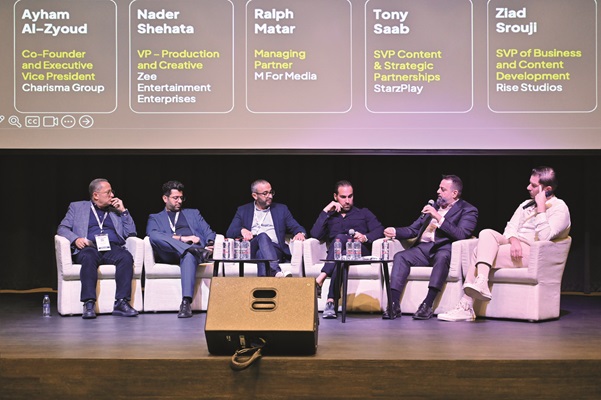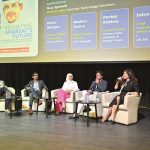As formats compete to dictate trends in a diverse MENA environment, what is the nature of content production? Content experts discuss new trends, upcoming business models, changing consumer behaviours and how to work in an evolving marketplace.
While connectivity and consumption grow, accelerating the content economy, broadcasters are set to capitalise on the opportunities. From scripted and non-scripted shows, international adaptations, partnerships and co-productions to their funding and financing, where are we headed?
The nature and scale of these trends and formats, the pressing need to create rich Arabic content that can travel, and the challenges and opportunities of co-production models as well as their monetisation capabilities were analysed extensively at the ASBU BroadcastPro Summit last month.
Discussing The Future of Content Creation in MENA: Trends and Business Practices was an expert panel consisting of Ayham Al Zyoud, co-founder and Executive Vice President, Charisma Group; Nader Shehata, VP – Production and Creative, Zee Entertainment Enterprises; Ralph Matar, Managing Partner, M For Media; Tony Saab, SVP Content and Strategic Partnerships, StarzPlay; and Ziad Srouji, SVP of Business and Content Development, Rise Studios.
Charting the course of the discussion was moderator Badih Fattouh, CEO, Creative Venture, who opened by summing up what was in store for us during the session, namely gaining insight into existing trends and understanding the status of content production. Addressing Charisma’s Al Zyoud, Fattouh asked him to identify the trends that prevailed, what was working, and what people were watching.
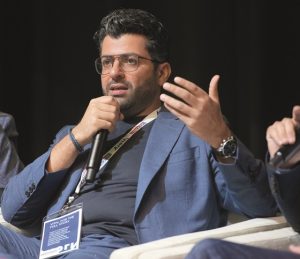
Cause and effect: The chicken or egg dilemma
“From a producer point of view, to be honest, we don’t know. Is it the chicken or the egg?” said Al Zyoud, laughing. “Are platforms pushing content, or audiences pushing demand? At the end of the day, we are watching what they offer, not exactly what we want, and I’m not sure how they choose content. As a producer, we notice clients follow trends based on their statistics, and they need to explain how they bring their statistics.”
Fattouh queried if this was within the context of scripted versus non-scripted, a combination of the two or relevant to shorter or longer episodes.
“I don’t think the market is still mature, especially for platforms,” Al Zyoud observed. “There’s demand for linear TV even as platforms get bigger. We have scripted and unscripted; for scripted, it is the international adopted formats. It is a tested idea: good title in the West, ticks all the boxes, so let’s Arab-ise it.”
While this enhances local skills, he says it limits the ability to produce original content. “We need to see how we can take local original content to the world.”
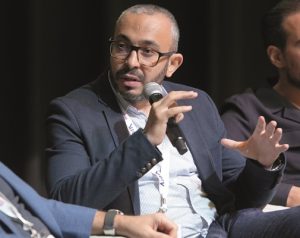
Zee’s Nader Shehata took the discussion forward from here. “For ATL, the production arm of Zee, we are using data from our broadcasting channels to gauge what viewers want,” he said. With Arabic content evolving rapidly, “You cannot have a standard manual for what viewers want. And you will always find different points of view between the producer and the broadcaster.”
He remarked that rating guidelines dictate what is trending, whether they be drama or sitcoms, etc.
“Social and family drama is always on the top, but trends change. Two years ago, it was horror-thriller, with Safah El Giza becoming very successful.”
Al Zyoud asked if platforms had the power to push trends and Shehata confirmed that they did indeed have that power. If so, Al Zyoud wanted to know how platforms made their choice.
With demand constantly shifting, the only genre that was stable was “talk shows, especially free-to-air … a must on every grid”, observed Ralph Matar. “And as Ayham mentioned, the non-scripted show has proven its viewership. However, it is an emerging market and we’re still in the trial-and-error phase where we are trying to gauge what genre is more in demand than others.”
StarzPlay, however, is confident about its data.
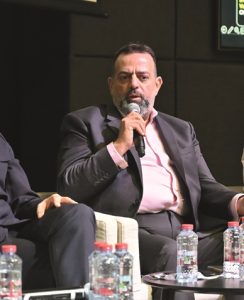
“From our side, we have very good knowledge on what our users want,” said Tony Saab. “We act based on the analytics of our data. If we think something is working for us, we continue to enhance and produce more of it. We rely on three major verticals: sport, output deals with major Hollywood studios and production. Recently, we commissioned a production from a Qatar studio, a combination of local and Hollywood talent – in this case, Eric Roberts.”
Within the mutually agreeable genres and a ‘what-works’ ecosystem, platforms and channels have their comfort go-to content.
Ziad Srouji said: “You can check what will work … through benchmarking, comparing, contrasting … this is how you keep on acquiring, but it can be a tricky, slippery slope because you’ll end up repeating yourself. And this is where Rise Studios steps in. We take risks. We work on content that has previously succeeded, but we also try to [introduce] content that has never been thought of.”
Hiring good talent, working on new concepts and having a good partner to de-risk content are important, he remarked. “This takes the argument back to the dilemma Ayham pointed out at the onset – are we the chicken or the egg? Sometimes it works to be a chicken, whereby you come up with content, you have a good partner and it pays off. Sometimes it doesn’t. At Rise Studios, we don’t claim to be creative producers, but are a platform that understands content and the business behind it.”
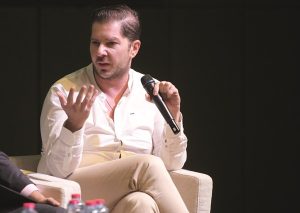
Asked what value Rise brings in terms of financing, being neither a producer nor a broadcaster, he stated that Rise’s business models are evolving and changing according to market demand.
“A couple of years ago we were all about windowing – you go pay TV, free-to-air and so on. This has shifted, with platforms now having an appetite for owning. It was fun at the beginning, then became very costly.”
He sees a market re-shift towards co-sharing or co-production: “If we believe in a project, we get it off-plan or commission or produce completely to be made available for a platform, as complete buyout or as windowing, on a deal-by-deal situation.”
Financing strategies and modules
While it was the norm for channels and platforms to depend on the executive director for bridge financing, financial plans do not really facilitate production. There are limitations on content produced, staff, development and so on.
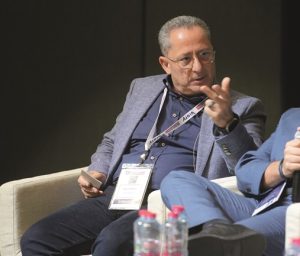
“We facilitate that progression. Because commissioning doesn’t only mean ‘I’ll pay you up front’. It also means that you have my approval to produce and make it available for you,” stated Srouji.
Saab described StarzPlay financing models as a mixed bag. “We started producing a while back and co-produced with some big local production houses. We are now syndicating or selling our original content, and we are open to working with all platforms and channels.”
Further clarifying the StarzPlay windowing models, Saab said: “We have the pay-one window, re-license the second exclusive window, and do the library after. Doing this gives us a revenue stream to produce more content that we believe will work. The other way is to coproduce with another platform or with major production houses.”
Additionally, the rebate system is showing positive signs, Matar pointed out. “It is healthy, and it used to be for movies and scripted but now they’re venturing into non-scripted as well. We are producing a show in Neom, which is funding half the production. It helps because even if you’re commissioned, you need to bridge finance the whole thing. Having entities such as Neom or twofour54 venturing into non-scripted is good for producers.”
Having commissioned a lot of scripted content in the last few years, Shehata spoke about Zee’s financing prototypes.
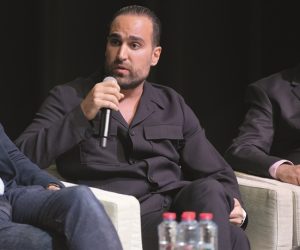
“At ATL, our vision is to reduce gaps in the industry and to create a running franchise that can generate revenue and attract more viewers. We position ourselves as a production studio and private investor while using our broadcasting power to help production. And in doing this, we are trying to create successful formats that can travel outside the MENA.”
Al Zyoud remarked that “commissioning is less risky for producers and for the end user … they pay less, take their money, supervise the work and give you commission. You make your 10-15% safely, but it’s not great for the industry. What we should work on is co-production between us producers and, say, broadcasters, so we both pay and make money from international distribution.
“We need to adopt the Turkish and Korean models, where you break even from the local market and profit from international markets. We need to watch content from the region other than Aladdin. We have the talent and the stories, and we don’t want to watch Spider Man 11,12 and 13.”
Creating the right partnerships
Co-production is a complex, multi-layered process in terms of co-production, co-financing and windowing, and Fattouh asked what sustainable working styles would endure.
Co-production is a big word, agreed Srouji, and the production process is very complicated, with a lot of decision-making from a creative, financial and distribution perspective.
“It’s important to identify the right partner, because decision-making in the important aspects of the field is crucial. Co-producing with a platform is different. I don’t know if a successful coproduction deal has been done with a platform, because platforms usually want entire rights. They are not going to be sub-licensing, so there’s not another stream for revenues.”
 What about co-production in terms of creative collaboration between entities, so as not to be entrapped in the commissioning model? asked Fattouh. When a platform or broadcaster cannot pay more than X amount of money for a certain production in which two parties come on board, production is taken to a different level, with different windowing opportunities in terms of pay-TV rights, SVOD and FTA.
What about co-production in terms of creative collaboration between entities, so as not to be entrapped in the commissioning model? asked Fattouh. When a platform or broadcaster cannot pay more than X amount of money for a certain production in which two parties come on board, production is taken to a different level, with different windowing opportunities in terms of pay-TV rights, SVOD and FTA.
The panel then went on to discuss why co-production does not work in the region.
Al Zyoud clarified: “In cinema, you have three main streams – digital rights, FTA and cinema – whereas in drama, you only have FTA and platforms. But here we are discounting international distribution, and this is an area to tap into.”
When Fattouh countered that this didn’t currently exist, Al Zyoud averred that it must be created.
“You asked a very important question at the beginning of the session about who was creating trends. It is somebody who has the courage. In the past two years, we have watched 10, 15 episodes on Shahid and Netflix. Then MBC came forward with a long-form series that is trending. They created that trend. Maybe it’s not in the mandate of the platforms to go international. That’s why we’re proposing to create content that appeals to the international market.”
 “I think it can be done with movies and series, like we did with Baghdad Central,” said Saab. “We co-produced with Hulu and a major European one. With a movie like Harley, we took all the buyout after theatrical and kept the theatrical for the producer. So there are ways of doing a co-production.”
“I think it can be done with movies and series, like we did with Baghdad Central,” said Saab. “We co-produced with Hulu and a major European one. With a movie like Harley, we took all the buyout after theatrical and kept the theatrical for the producer. So there are ways of doing a co-production.”
Shehata seconded this. “We don’t have the same windows for drama and cinema, but it exists and you have different territories that you can sell in. The main challenge with co-productions will be to solve IP sharing issues. Our business model has shown that content travels. We have produced nearly eight series, four of which are travelling outside the MENA.”
Why, then, are we not growing that side of the business? asked Al Zyoud. “Because the market is unorganised,” Shehata responded.
The panel looked at all the current missing links, such as a media fund and a government-led organisation that could regulate processes. “Not only governmental, maybe a proper union would help us push our content externally,” remarked Srouji.
Winding the session down, and optimistic about a dynamic period in the future, Fattouh asked about the challenges and opportunities in taking content forward.
 Al Zyoud urged that the industry “take the risk together … we still need linear TV, but we need to see the opportunity in prime-time viewing and rethink and re-study the strategy, because live TV will never die”.
Al Zyoud urged that the industry “take the risk together … we still need linear TV, but we need to see the opportunity in prime-time viewing and rethink and re-study the strategy, because live TV will never die”.
Shehata pointed out that challenges include “not having insurance for productions, monetisation issues, and a responsible IP registration procedure”, but added that there was opportunity in collaborating with global platforms.
Matar pointed out that Dubai is one of the best cities in the world and Saudi Arabia has one of the biggest projects coming up, “so the industry should reflect on its evolution and aim to reach a point where we have an Arab Hollywood or an Arab Bollywood in the region”.
Saab listed costs of production that are “sometimes not justifiable” and piracy as big concerns. “We invest huge amounts of money in content that is on all the pirated platforms the next day.”
Srouji concluded that in an industry rich with multiple layers of audiences, needs and requirements, “It’s time we take risks with content, rethink our business models, the way we position and how we position. Our market is a wide and abundant market, and it is worth looking at things more in a chicken-egg situation, and not be afraid to be the chicken or the egg.”




































































